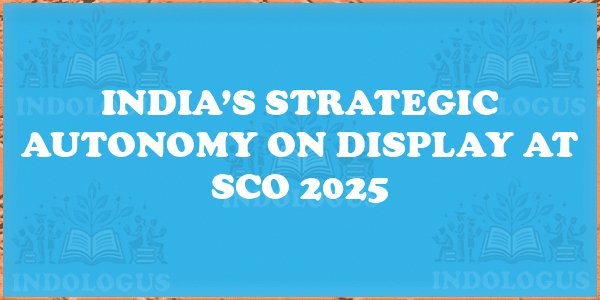Learn about India’s strategic stance at the 2025 Shanghai Cooperation Organisation (SCO) Summit displaying its commitment to fighting terrorism and maintaining strategic autonomy.
Why in News?
India’s refusal to sign the SCO joint statement in June 2025 underscores its zero-tolerance stance on terrorism and readiness to stand alone within multilateral frameworks.
Understanding the SCO: Static & Background Facts
- Founded: 2001 (evolved from Shanghai Five, 1996)
- Members (2025): India, China, Russia, Pakistan, Kazakhstan, Kyrgyzstan, Tajikistan, Uzbekistan, Iran, Belarus
- Headquarters: Secretariat – Beijing, RATS (Regional Anti-Terrorist Structure) – Tashkent
Key Focus Areas
- Counter-terrorism
- Regional security
- Economic cooperation
India’s Strategic Calculations
- Refusal to sign reflects zero tolerance for selective treatment of terror incidents.
- Strong message: Peace and terrorism cannot coexist.
- India’s principled stand amidst diplomatic pressure.
Implications for Regional Security
- RATS effective coordination: Prevented 20 attacks (2011–2015).
- India’s move raises concerns about the credibility of SCO’s counter-terror commitments.
China’s Influence & India’s Response
- China’s influence as 2025 SCO chair.
- India resists BRI endorsements and emphasizes issue-based engagement.
Strategic Autonomy in Action
- India engages in various alliances without being bound by any.
- SCO is crucial for access to Central Asian energy and markets.
Lessons for Counter-Terrorism Cooperation
- Unified definitions of terrorism needed for true collaboration.
- Bilateral rivalries may disrupt multilateral actions.
Future Outlook
- India to pursue selective engagement within SCO.
- Continued stand on principled foreign policy.
Key Takeaways for Competitive Exams
- India’s strategic autonomy at SCO 2025 reflects zero tolerance for terrorism.
- RATS plays a vital role in coordinating counter-terrorism efforts.
- India’s approach emphasizes issue-based engagement over alliances.
- Consensus models like SCO may face challenges when national interests diverge.



